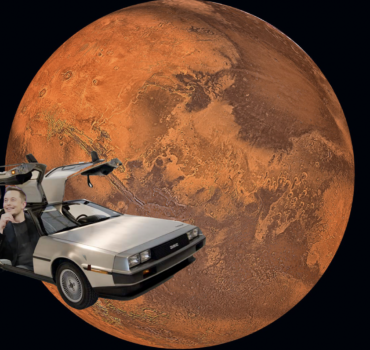
Time’s Person of the Year is inventor-cum-possible Bond villain Elon Musk, and some people are not happy about it. Those opinions aside, I couldn’t help noticing the contrast between this year’s figure and Greta Thunberg, Time’s choice in 2019.
Both Greta and Musk are climate action champions, but of a different kind. Greta embodies an almost punitive activistic spirit; refusing to fly, once sailing across the Atlantic. Musk, on the other hand, while perhaps not as beloved a figure in the climate activism community, has perhaps done more for our climate than anyone else (His company Tesla sold enough cars this year to save about seven million metric tons of CO2 from being emitted.) Though as the Guardian points out, of course, we don’t know whether he recycles his yoghurt tubs at home…
You see, I am all for Time Magazine’s choice of Musk, and mostly because he represents the kind of philosophy I think is so lacking at the moment: genuine optimism about the future of humanity. Musk understands that solving climate change should be, ultimately, super cool. While some may hark on about a return to walking and biking, Musk offers the Tesla model 3, in which one can accelerate to 100km/h in around 3 seconds flat…
The Muskian-attitude, then, is what I hope the next decade can spearhead. By 2030, we may very well be a “multiplanetary” species, with abundant, clean energy, and yes – even flying cars. In that spirit, allow me to sketch a techno utopian vision…
Nuclear power, for decades shunned by the green energy community, is having a well-deserved comeback; France is building six new ones, for example. Additionally, the first real steps in nuclear fusion are also happening. Fusion power – which essentially aims to re-create miniature suns on Earth – uses only seawater as fuel, meaning we could essentially power humanity’s energy needs for the next 13 million years. The US-based fusion start-up Helion drew $500 million in funding earlier this year, with a goal to build the first commercial fusion plant by the early 2030s. What’s most crucial here are the things we will be able to do with cheap, abundant energy: much more recycling, computing, building, robotics and carbon capture without worry.
Next, Space! The first orbital test flight of Musk’s “Starship” rocket is early next year. If successful, the rocket could be the most fundamental paradigm-shift in the space industry since Apollo 11. Being fully reusable, costs per-kg-into-orbit on Starship are around $35/kg, or about 1000x less than NASA’s Shuttle. Musk is scaling up production of the rocket into the thousands, and he hopes it will take us first back to the moon, and then onto Mars. But there are other benefits to a cheap, fully reusable rocket–super-fast travel on Earth; Starship could take you from London to Hong Kong in 34 minutes. What’s more, cheap rocketry could kickstart the space-mining industry, eventually moving all ecologically damaging mining “Off-world.” (Musk’s even recently started a project turning CO2 into rocket-fuel…)
And finally – yes- flying cars are here just in time for the 2020s. If you are feeling bummed out about how the future turned out to be, I encourage you to check out the “Jetson1” company on YouTube, as well as test flights by “Urban Aeronautics”. Advances in droning and battery technology mean that vertical take-off, easily pilot-able flying cars are now possible, and boy do they look cool. Paired with those other forecasted developments in energy cost reduction, flying cars have more mass-market potential later in the decade. Which means no more sitting in traffic. Urban Aeronautics has already secured a purchase deal with an Israeli emergency service company, to provide a kind of air ambulance with the total ground footprint of your average Honda.
So, all in all, it looks like this may be the decade we finally get that “future” we’ve been waiting for. Solving climate change can be fun – but we should look beyond that, to what we can do, for example, with 13 million years of abundant, free energy.
According to the Guardian, the majority of Western teens in a recent survey answered “no” to the question “do you feel that your generation will have had a better life than your parents’ generation?” Building these new technologies – spaceships, fusion and flying cars – is thus just as much about solving material challenges as it is resurrecting a more optimistic narrative for humanity.









